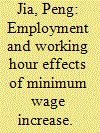| Srl | Item |
| 1 |
ID:
130981


|
|
|
|
|
| Publication |
2014.
|
| Summary/Abstract |
Using a difference-in-differences model, the present paper provides empirical evidence of minimum wage effects on employment and working hours in China. The results show that male employment is not affected by a minimum wage increase, although men's working hours do increase. In contrast, female employment is more likely to be negatively affected by a minimum wage increase, while their working hours remain unchanged. This may lead to women being in a more disadvantaged position in the workforce, and adopting a monthly minimum wage may induce firms to extend men's working hours. Therefore, to better protect disadvantaged workers, we suggest that minimum wage regulation should focus on the target group of less-educated women, and that a unified minimum hourly wage needs to be set for both full-time and part-time workers. Meanwhile, the importance of human capital accumulation should be addressed in alleviating the negative effects of minimum wage increases.
|
|
|
|
|
|
|
|
|
|
|
|
|
|
|
|
| 2 |
ID:
157961


|
|
|
|
|
| Publication |
New Delhi, Life Span Publishers and Distributors, 2015.
|
| Description |
v, 71p.hbk
|
| Standard Number |
9789381709474
|
|
|
|
|
|
|
|
|
|
|
|
Copies: C:1/I:0,R:0,Q:0
Circulation
| Accession# | Call# | Current Location | Status | Policy | Location |
| 059330 | 320/RUS 059330 | Main | On Shelf | General | |
|
|
|
|
| 3 |
ID:
139263


|
|
|
|
|
| Summary/Abstract |
Intensifying labour conflict in China has posed a serious challenge to the industrial relations system. Under growing pressure, the Chinese government has sought to reform the system but the results are meagre. Among the supposedly successful cases, the development of collective bargaining in Wenling, Zhejiang province has been hailed as a model of labour relations to be replicated elsewhere. Based on a detailed case study of Wenling, this study aims to analyze the process whereby local government reconstructs the industrial relations system by organizing and incorporating the interest of employers and workers, leading to regularized wage growth and reduced labour dispute. This restructuring, the study argues, is designed to create a functional state corporatist system by means of expanding union representation and instituting tripartite collective bargaining. However, the tensions in the state corporatist structure may still undermine any attempt by the government to reconstruct industrial relations.
|
|
|
|
|
|
|
|
|
|
|
|
|
|
|
|